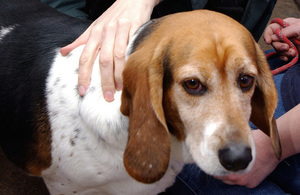Tougher dog breeding licence controls to protect puppies
Tougher dog breeding licensing to protect the welfare of puppies from back street breeders will be introduced under proposals announced today.

A dog
A consultation is seeking to strengthen the regulations around dog breeding and pet sales to make it easier to identify and take action against irresponsible breeders who pay little regard to the health and welfare of the puppies they raise. This is a particular problem amongst smaller breeding establishments – known as ‘backstreet breeders’ – which supply thousands of dogs to UK families each year.
Animal Welfare Minister George Eustice said:
We are a nation of dog lovers but it is crucial that puppies are cared for properly and socialised in the first three months if they are to enjoy healthy and happy lives.
We are aiming to reform the licensing regime we have so that smaller puppy breeding establishments must abide by the same regulations and licensing rules as bigger breeders so that the worst offenders can be dealt with more quickly.
We are also reviewing other animal related licensed activities such as pet sales to address problems associated with the growing trend for internet sales that can contribute to impulse buying.
The consultation will tighten up the licensing regulations for breeders by clarifying existing rules requiring any breeding businesses to have a licence. The proposals will also increase the number of smaller backstreet breeders - who may not consider themselves a business - that will require a licence by making it a requirement for anyone producing three or more litters of puppies in a year.
The consultation also seeks to formalise the adoption of existing model conditions on good breeding health and welfare by making it a requirement of breeders to comply with the conditions and for local authorities to use them.
Claire Horton, CEO of Battersea Dogs & Cats Home and non-executive Director of AHWBE, said:
Battersea Dogs & Cats Home has long recognised the cruel problem of backstreet breeding in Britain. The government’s proposals are extremely encouraging, having listened to the important calls we have made in our nationwide campaign to end this unacceptable practice.
Reducing the number of litters a breeder can produce in a year, without a licence, will ensure that more breeders will be brought under the scope of regulation, which we believe will protect the lives and welfare of more of the vulnerable dogs who really need it. It will also provide greater protection for buyers – those looking to take on a dog deserve to be confident that their puppy has been given the best start in life, and bred by a responsible, properly-regulated breeder.
Local authorities will also be able to better target their enforcement activity by directing less resource at responsible businesses, for example those who are controlled by the Kennel Club’s UKAS-accredited Assured Breeders’ Scheme - which has 6,000 members. This will free up resources to follow-up on reports of poor welfare at backstreet breeding establishments.
For the first time, the consultation will also clarify that online retailers selling puppies should be treated in the same way as high street pet shops by local authorities – meaning they must abide by the same licensing and welfare regulations.
Through the Pet Advisory Action Group (PAAG) – Defra and welfare charities have worked with six major online advertising sites to remove over 130,000 inappropriate adverts of pets where there were concerns about the welfare and background of the animal.
PAAG is now looking at broadening this successful approach to other sites, and to educate prospective buyers to what they should be looking out for if they are looking for a pet online, such as if can they visit and see the dog with its mother before they buy and check that the seller is a properly licensed breeder.